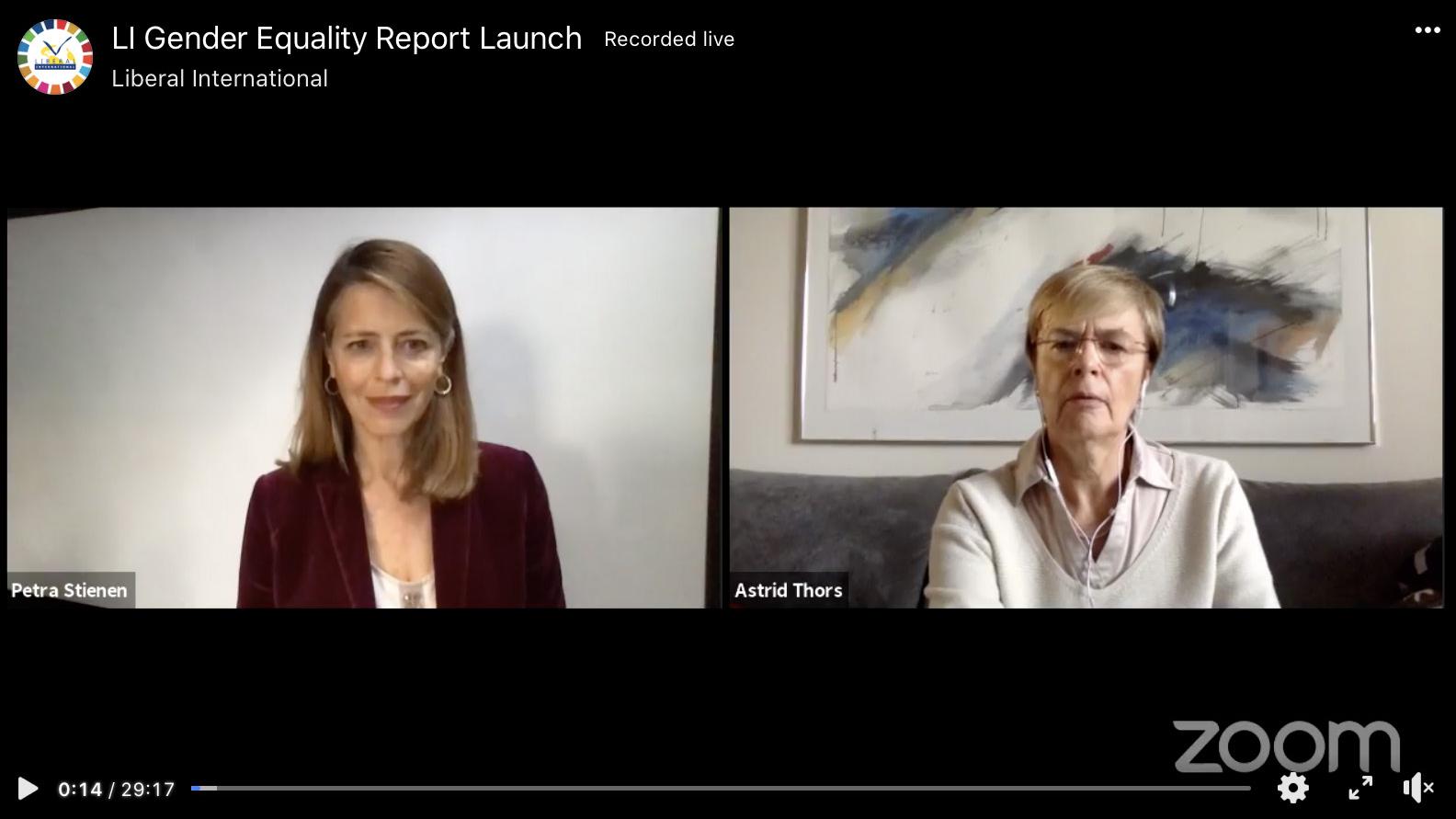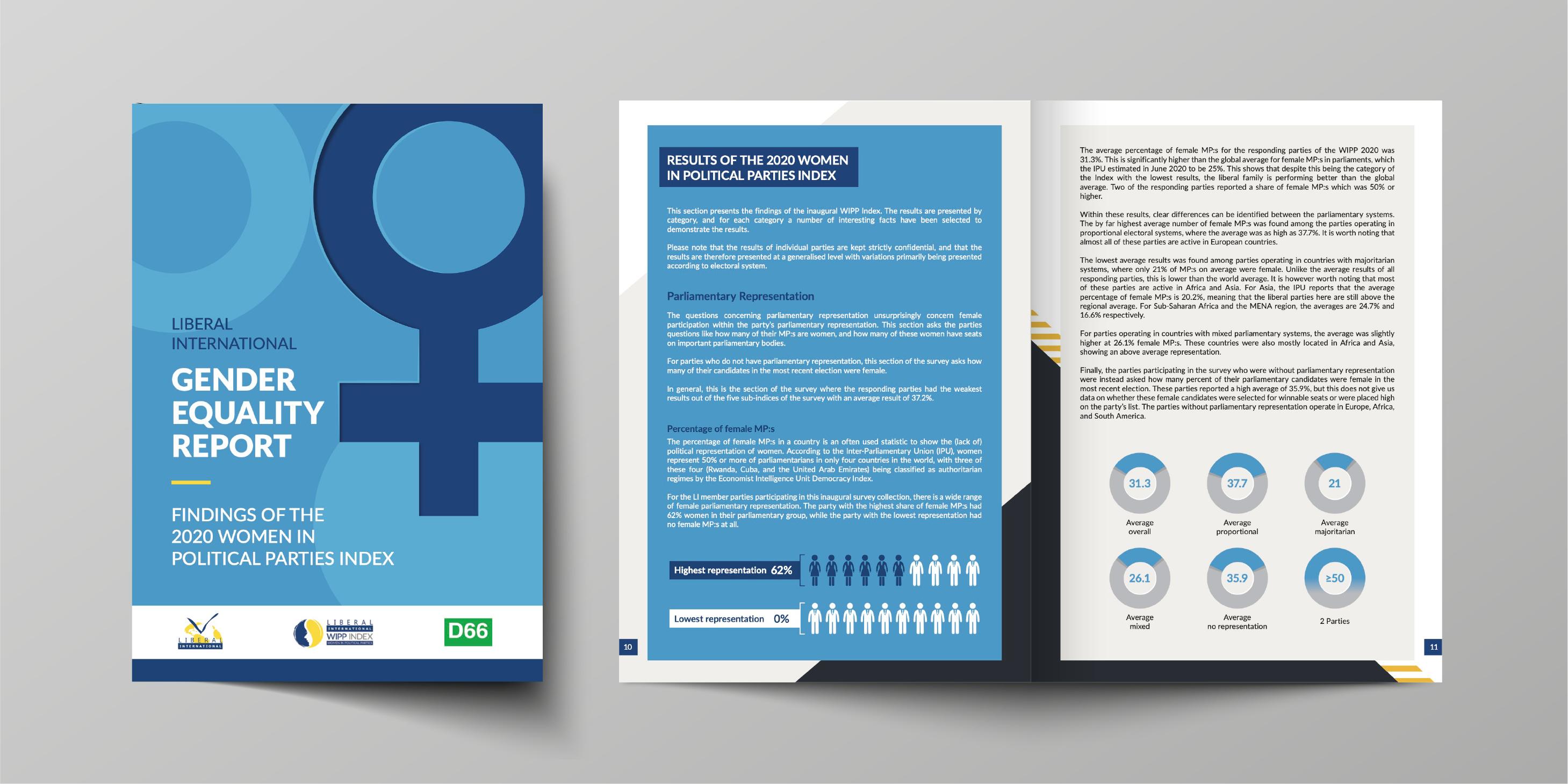
5 minute read
Liberal women break down barriers to representaton at the launch of LI’s Gender Equality Report
Liberal women break down barriers to representation at the launch of LI’s Gender Equality Report
Online (26 October 2020)
Advertisement
Taking place on the eve of the LI virtual congress administrative session, this report workshop was the culmination of one of the LI Human Rights Committee’s most important projects in for 2020. In addition to presenting the results of the survey, this event also engaged participants in a discussion on some of the barriers to achieving female participation in political parties with invited speakers from the liberal family.
To discuss these important issues, the event brought together LI Vice President and LI Human Rights Committee Chairperson Astrid Thors, Chairperson of the Women’s League National Unity Platform Flavia Kalule Nabagabe, Director Gender and Women for NDI Sandra Pepera, Executive Director of Boris Divkovic Foundation Anela Lemeš, Councillor in Sarajevo and International Officer for Naša Stranka Cllr. Jasmina Mršo and Councillor in South Dublin County Council for Fianna Fáil Cllr. Emma Murphy. The event was moderated by Dutch Senator for D66 Petra Stienen.
Presenting the inaugural Liberal International Gender Equality Report, Astrid Thors thanked the member parties who participated in the 2020 Women in Political Parties (WIPP) Survey. She stressed that liberal parties are often performing above average when it comes to the representation of women, with many parties having extensive training programmes and strong representation of women in their parliamentary groups. However, many challenges remain, and many parties can do more to ensure that their female representatives have a strong voice.
Engaging in a dialogue with moderator Petra Stienen, Flavia Kalule Nabagabe presented the work and the challenges she is facing in setting up the women’s league of a new political party in Uganda. The 2020 WIPP Index found that 83% of responding liberal parties do have some form of women’s wing.


“We decided to set up a women’s wing since women’s issues are crucial and we need to address them. If we mainstream these issues across the party structure there is a risk of them being left behind, and in this way, we can highlight them in particular,” she explained.
Debating the pros and cons of introducing quotas for women in political parties and parliaments, Emma Murphy argued that quotas institutionalise discrimination, giving women a preference over men. She explained that women are often selected simply to qualify for funding or to follow the rules, rather than to get elected, causing them to not be taken seriously as candidates. Finally, she stressed that they do not tackle the issue from the bottom up but merely act as a quick fix for counting heads.
Arguing in favour of the use of quotas for women, Sandra Pepera argued that they are not discriminatory, but instead meant to undermine long-standing historical patriarchal inequalities. She stressed that gender is still the largest inequality gap, outnumbering health, economics or any other factor. She raised that 77% of parliamentarians are still men, and that the impact of quotas is undeniable and immediate.
“I will know that I have achieved gender equality when I can be as mediocre as some of the men. Why does every woman have to be a star? There are so many mediocre men in politics,” she said.
Explaining the bottom-up mind-set that their political party Naša Stranka has adopted in Bosnia and Herzegovina, Anela Lemeš and Jasmina Mršo briefed participants on how their party has managed to achieve equality in almost all aspects of party politics through their project Initiative 50%. “We do not have a women’s wing – instead Initiative 50% is a cross-party initiative applying to everything we are organising as a party,” Jasmina Mrso explained, stressing that the reason for the success of the initiative was managing to achieve a bottom-up change in the philosophy of the party itself.
“The legislative quotas we have in Bosnia and Herzegovina haven’t worked, but our changed philosophy in achieving true equality of representation and influence has been very successful.”
In her conclusions, Petra Stienen turned a famous saying around to emphasise the positive aspects of mobilising women for real change. “Remember, there is a special place in heaven for women who promote other women.”
This event was organised by Liberal International in cooperation with D66.

Gender Equality Report - Findings of the 2020 Women In Political Parties Index
This report presents the findings of the 2020 Women in Political Parties Index, the first of its kind tool developed by Liberal International to assist our membership in evaluating and improving their inclusivity as political parties.
The Index is based on a self-assessment survey, which was opened to the LI membership for the first time in March 2020, and all eligible parties were able to submit their results until June 2020. The result of this data collection is presented in this report.
The results find that in many ways, liberals are at the forefront of the global fight for gender equality. The global liberal family is consistently ahead of the regional trends for representation of women in parliaments, and many have comprehensive training programmes to strengthen and empower female candidates.
Despite this, many challenges remain. Many liberal parties have still never elected a female leader. Work remains to ensure that our party structures are equipped to record and follow up the threats and harassments we know that female candidates and politicians face. We must continue to actively acknowledge these challenges, and to train and educate our memberships as we strive to become more inclusive as political parties.
In providing these results, Liberal International’s objective is to assist our member parties in promoting greater participation of women in politics, which research consistently shows benefits political parties, countries, and governments.








